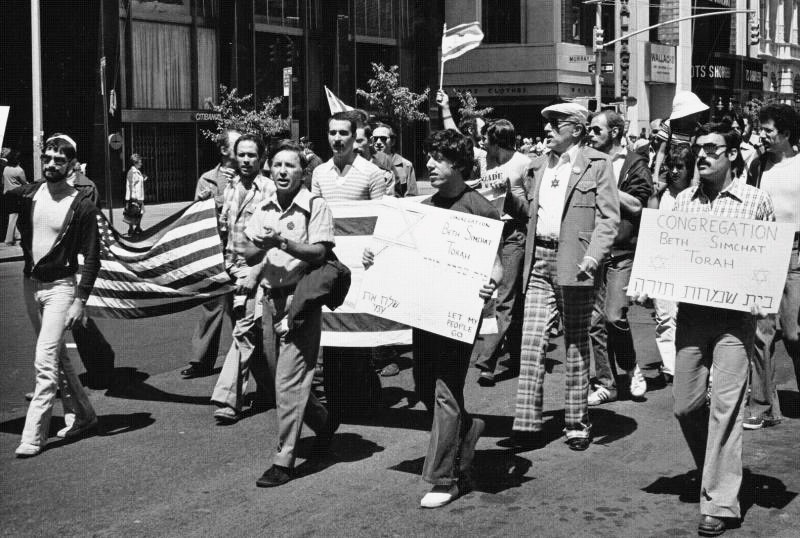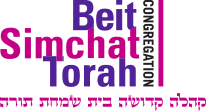
CBST History
The Early Years
In 1973, Jacob Gubbay, a gay Jewish man from India, was living in New York and noticed a small ad for a gay Passover Seder at the Church of the Holy Apostles, in Chelsea. Gubbay volunteered to lead the Seder that night and retold the story of our liberation from Egyptian slavery; and with that, the idea of a gay synagogue was born.
Shortly after the seder, Jacob Gubbay negotiated a way to conduct weekly Friday night services in the church and in less than a year, a small ad was placed in the Village Voice announcing the gay synagogue’s first Friday night service. The evening turned out to be a miserable, freezing night in February and barely a minyan attended. But after that, word spread and attendance began to grow. Each week, someone carried a shopping bag filled with all that was needed to have the service including: candles, wine, a kiddush cup and challah bread – and because of that, the synagogue first became known as “the shopping bag synagogue.”
By 1975, approximately 100 people regularly attended Friday night services and twice that came to services for the High Holy Days. Then, as momentum began to build, the synagogue felt it was important to identify itself officially and chose the name, Congregation Beit Simchat Torah. In 1976, CBST moved to a loft in the Westbeth Complex on Bethune Street in New York City’s Greenwich Village, where it would remain for the next 40 years.
In the years that immediately followed, CBST increased its activities and its visibility within the community and grew in both size and membership. By 1982, CBST welcomed 200 members to the regularly-sheduled weekly Shabbat services, and upward of 500 people to its Yom Kippur / Kol Nidre service. With its pulse on a social compass, CBST joined the First Gay Rights March on Washington in 1979; and from that point on became a regular stop during the rounds of both city and state legislators, incuding: Manhattan Borough President, Andrew Stein; Mayor, Ed Koch; and U.S. Congressman, Theodore Weiss.

The AIDS Crisis
In 1982, when an immunological disease began to spread among gay men, CBST held a symposium on “Gay Diseases.” It was an extraordinary event, attended by over 350 people. Still, who could have ever predicted the atrocity the AIDS epidemic would become, or the destruction it caused to our community for more than a decade. For a congregation with a relatively youthful profile, CBST had experienced not more than six member deaths in the first nine years of AIDS; but then by 1992, its ravages would claim the lives of over 100 more. As new medications were later introduced, the rate of progression diminished; and by 1997, 50 additional members lives were lost to AIDS. The deaths of lovers, family and friends multiplied themselves over; and though they may have been lost to this mortal life, they remain forever in our hearts and are with us still.
1992: The Turning Point
CBST has always prided itself on the quality of its lay leadership and as the AIDS death toll mounted, the need for dedicated professional leadership became an urgent matter. The Board conducted a two-year search for a rabbi, who could provide pastoral counseling to the ill and officiate over the all-too-frequent funerals. In 1992, Rabbi Sharon Kleinbaum became the spiritual leader of CBST. Rabbi Alexander Schindler z”l, then President of the Union of American Hebrew Congregations, officiated at her installation on September 11, 1992 – an event he later described as: “a joyous occasion to be sure; but also, a moment filled with trembling awe, a moment fraught with far-reaching consequence for Rabbi and congregation alike.” The arrival of Rabbi Kleinbaum – lesbian, social activist, ardent Yiddishist and devoted Torah student – marked the beginning of an epoch at CBST.
And in another way, 1992 re-enforced CBST’s position as a thriving force. In order to accomodate everyone who wanted to attend the High Holy Days, CBST moved its Yom Kippur services to the Jacob Javits Convention Center. Attended by over 2,200 people, it became the largest gathering of lesbian and gay Jews in history. Thanks to CBST’s Open Door policy, a mission of longtime CBST member and gay community activist, Irving Cooperberg z”l, our High Holy Days services remain free and open to all, to this day! Kol Nidre services have continued to grow and in 2001, after the events of September 11th, a record-breaking 6,000 people attended.
The Millennium
Thanks to your generous gifts and the grants awarded to CBST over the years, we have been able to realize many of our visionary goals. Since 1996, the Cooperberg-Rittmaster Rabbinical Internship program, has made it possible for us to select two outstanding students from the Reform, Conservative, or Reconstructionist Seminaries to work at CBST for a period of one year.
CBST Continues to Grow as a Community
CBST members engage in activities through a rich network of community groups that are educational, social and socially-just. Currently, there are approximately 3,600 people who attend Yom Kippur / Kol Nidre services at the Jacob Javits Center, each year. And since many of our members’ families are growing as well, CBST has expanded its children’s programming to include Limmud B’Shabbat Hebrew School and Alef Bet Shabbat services.
CBST’s New Home at 130 West 30 Street
In 2011, CBST purchased the front of the landmark Cass Gilbert building, at 130 West 30th Street, as the culmination and the beginning of CBST’s Capital Campaign. The ground was broken in 2013 and construction on our building was completed in 2016. CBST marked the “Dedication of Our New Home,” that year with a celebration on April 3. Having wandered the city for 40 years, the CBST community has finally arrived at its permanent home, where we all can continue to actualize our dreams together – dreams that had never been thought possible in 1973; when barely a minyan arrived, for its first Shabbat.
Learn More about CBST History
- View the CBST listing in the NYC LGBT Historic Sites Project
- Explore the CBST Collection at The LGBT Community Center Archive
- Read the CBST 40th Anniversary Book: Changing Lives, Making History by Rabbi Ayelet S. Cohen
- And also read A Gay Synagogue in New York by Moshe Shokeid
- Read more aboutTrans & Nonbinary history at CBST
